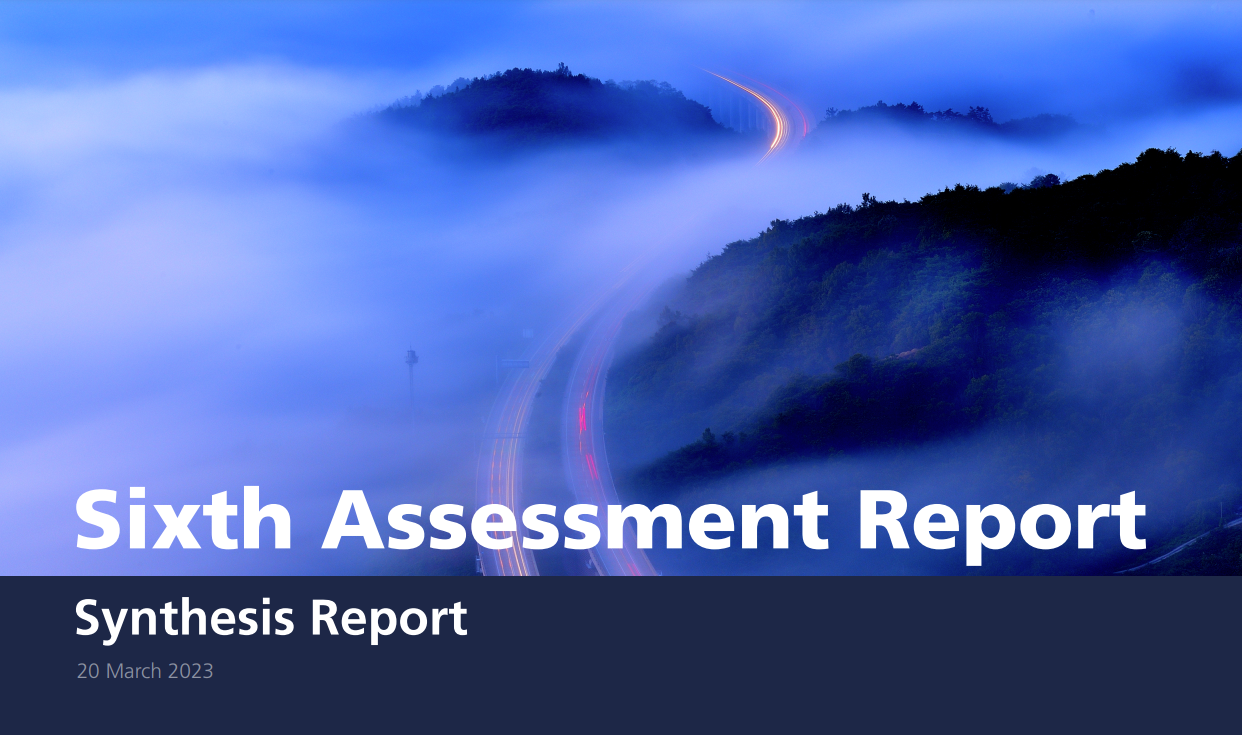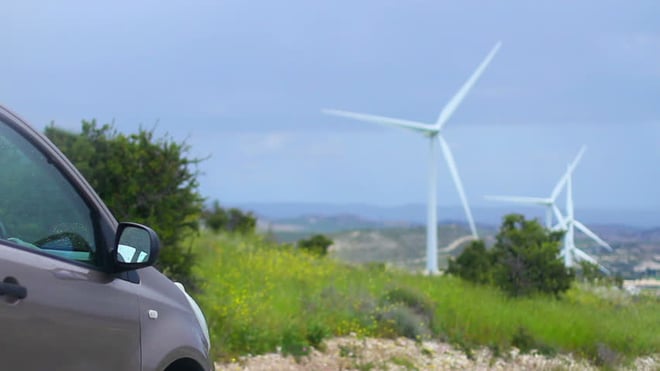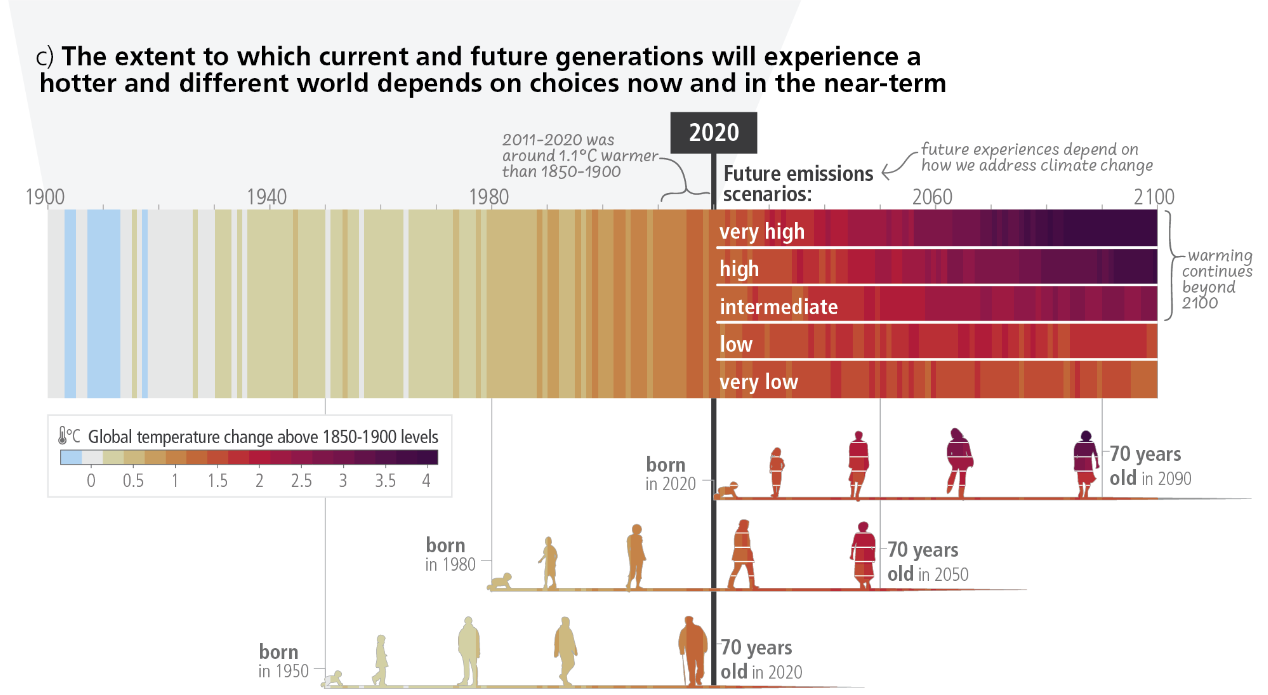 On Monday, the Intergovernmental Panel on Climate Change (IPCC) released its most recent report, which states in no uncertain terms that we need to increase the pace of greenhouse gas emissions reductions. To avoid the worst effects of climate change, the IPCC report said we must reduce carbon emissions by two thirds by 2035. With the release of the report, United Nations Secretary General António Guterres called on developed nations to achieve net-zero emissions by as close to 2040 as possible, rather than the 2050 date that has been the standard – and the date around which Massachusetts and Rhode Island climate policy has developed. What does this latest international call for urgency and speed mean for our work here in Massachusetts and Rhode Island?
On Monday, the Intergovernmental Panel on Climate Change (IPCC) released its most recent report, which states in no uncertain terms that we need to increase the pace of greenhouse gas emissions reductions. To avoid the worst effects of climate change, the IPCC report said we must reduce carbon emissions by two thirds by 2035. With the release of the report, United Nations Secretary General António Guterres called on developed nations to achieve net-zero emissions by as close to 2040 as possible, rather than the 2050 date that has been the standard – and the date around which Massachusetts and Rhode Island climate policy has developed. What does this latest international call for urgency and speed mean for our work here in Massachusetts and Rhode Island?
No Time to Waste
We fully trust the science behind the IPCC report and agree that it would be better to reach net zero by 2040 than 2050. It would be difficult to reach this target, but worthwhile, because reducing emissions faster will reduce all the harm to human life, the economy, and the natural world that will happen when temperatures increase beyond 2 degrees Celsius. Nonetheless, when the Boston Globe called to ask for our thoughts on whether the new IPPC report will cause policymakers in Massachusetts to move the net-zero date from 2050 to 2040 – if we were optimistic whether that the report would create the political momentum needed, we just had to be honest. We don’t see that happening – in Massachusetts or Rhode Island. (You can read the ensuing Boston Globe article here.)
In both states, a large majority of voters support acting on climate and the politicians know that. That’s why we have better laws than most states. But today, March 24, 2023, there does not seem to be the will to move the net zero date forward to 2040. We believe that to be true because elected officials see some limit to what their voters will accept. It's the perception of some good, hard-working, smart politicians that voters want them to take action and stay with some sort of “speed limit”. Maybe in a couple of years, the dynamics will change and the voters will cry out, “Go faster”. We hope so.
Also, both states have built up modeling, plans, and programs around the 2050 target. Revisiting that goal will delay the important implementation work we need to be focusing on now. We can’t afford to take two years to make our goals more stringent and redo the required modeling if doing so will take resources away from the action we need to take now.
That brings us to our larger takeaway from the IPCC report: we hope and expect that the report will inspire policymakers to take tangible actions to reduce emissions in the big three sectors: electricity, buildings, and transportation. And that is where our organization’s work is focused. As we have said on numerous occasions, both states have laws mandating net zero by 2050, but neither state has adopted the specific policies that would get us there.
The Path Forward Is Clear
To reach net-zero emissions by 2050 or even 2040, we have to make considerable progress this decade. Massachusetts must reduce economy-wide emissions 50% by 2030 and Rhode Island, 45% by 2030. Here are the key policies we see as needed in each of the three sectors mentioned above.
Electricity
To speed up the rate of decarbonization of our electric grid, Massachusetts can and should increase the Clean Energy Standard to 100% by 2030, or 2035 at the latest. Rhode Island is scheduled to reach 100% renewable energy by 2033 as a result of a 2022 law. We lobbied for a 2030 date, but 2033 is still a first-in-the-nation goal – and looking at Rhode Island’s climate plan, we see greater needs for improvement in the building and transportation sectors.
Transportation
There’s no doubt about it, to reduce greenhouse gas emissions in the transportation sector, we’ve got to rapidly electrify all vehicles and simultaneously reduce vehicle-miles-traveled (VMT). We need better public transit, along with safer walking and biking – that will require long, hard, sustained work since our entire landscape has been built around the automobile since the early 20th century. The fact that this work will be difficult does not mean we should not do it – it's work we need to start now and keep working on. On the bright side, it can be accomplished by 2040.
We also need standards like the Advanced Clean Cars II (ACCII) to clean up the fleet of vehicles on our roads and phase out new gas-powered cars by 2035. Massachusetts is in the process of adopting ACCII; Rhode Island needs a push. As the market progresses through the rest of this decade, we hope that there will be consensus nationally and within our states that the 2035 date can be pushed forward – but right now, that’s not legally possible for Massachusetts or Rhode Island to effectuate on their own.
 Electric Vehicle Ambassador, Aliou Niane, with his Ford Mustang Mach-E
Electric Vehicle Ambassador, Aliou Niane, with his Ford Mustang Mach-E
Adopting standards like ACCII of course won’t solve the problem on its own. There’s a whole slew of other policies we need in Massachusetts and Rhode Island too to speed the transition within this sector. But ACCII is the single most important thing a state can do to reduce transportation emissions. And that is why we are especially frustrated at Rhode Island’s slow walk on that.
Buildings
Within the buildings sector, we need a Clean Heat Standard to set a schedule for emissions reductions and a mechanism for tracking compliance. We need all new construction to be all-electric, and we need building performance standards for existing buildings that are larger than 20,000 square feet. And we need to set a date by which sales of new fossil fuel heating systems will be prohibited: just like ACCII sets 2035 as the last year for the sale of new gas-powered cars.
 If and only if those policies are adopted within the next couple of years, our states have a good chance of meeting targets for 2030 (50% in MA and 45% in RI) and 2040 (75% in MA and 80% in RI).
If and only if those policies are adopted within the next couple of years, our states have a good chance of meeting targets for 2030 (50% in MA and 45% in RI) and 2040 (75% in MA and 80% in RI).
This Will Take Some Work
Implementing those policies will require funding and regulations that not everyone will like. There will be resistance and many people will say that we cannot afford it or that the rules are too onerous. Our response is to refer back to the IPCC report. The damage to this planet and to all of us from our consumption of fossil fuels is something we cannot afford.
What the IPCC shows now, as it has with its previous reports, is that arguments calling for a delay in climate action based on economics are hollow because the costs of mitigation are much less than the costs of adaptation and suffering. Furthermore, study after report has proven that the most disadvantaged people on Earth and in Massachusetts and Rhode Island will suffer the most if we delay action.
 A stark reminder from the IPCC of what different scenarios look like within our children’s lifetime (Source: IPCC AR6 Sythesis Report)
A stark reminder from the IPCC of what different scenarios look like within our children’s lifetime (Source: IPCC AR6 Sythesis Report)
We Have The Tools We Need
In our view, the IPCC report will cause our elected officials to re-read the laws that we have now on the books and then establish the supporting laws and regulations necessary to accelerate emissions reduction – both legislatively and in the executive branch.
We will end with this. In 2015, Green Energy Consumers Alliance was a co-plaintiff in a suit brought by the Conservation Law Foundation against the Commonwealth of Massachusetts for its failure to write certain regulations called for by the Global Warming Solutions Act as they related to meeting the interim target for 2020. In 2016, the Massachusetts Supreme Judicial Court ruled unanimously in our favor, forcing the administration of then-Governor Baker to issue new regulations to speed up emissions reductions
In both states, climate laws are binding. That means if state governments fail to execute policies to the extent necessary to reduce emissions 50% by 2030 in Massachusetts and 45% by 2030 in Rhode Island, they can be sued as Massachusetts was sued in 2015. Green Energy Consumers is prepared to take that route again if we must, and the IPCC report will be Exhibit A.





Comments